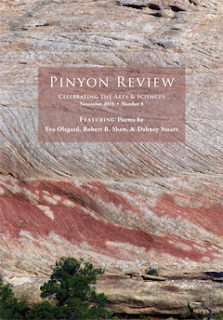When I opened the latest edition of Pinyon Review, A Journal Celebrating the Arts and Sciences, I was initially puzzled by Editor Entsminger’s
introduction to the journal entitled “The Scarecrow,” but after reading the
entire issue I realized that he had transposed and woven short lines from most
of the selections within its pages to form a lovely introductory mosaic. In
this issue, he also treats us to one of his own lighthearted poems about a
cowgirl in a “pheasant feathered felt derby hat” who roams in a place where “no
one spends/ their lives on indifferent things,” setting the tone that represents
most Pinyon Review issues – a tone that
combines levity and serious thought.
The Pinyon Review
is always a “glad surprise,”* and this November issue contains a gracious
plenty of poetry and art, but the cogent selection that spoke to my condition
was a provocative book review of Notes on the Death of Culture by Nobel Prize winner Mario Vargas Llosa. In this
critical review about cultural decline, Jack Starr underlines LLosa’s idea that
“…committed writers should resist the temptation to seek immediate success
through entertainment alone…and must breathe life back into our culture, our
development of the mind, our way of life, and our spirit that guides…” In the
short three-page review, Starr elucidates Llosa’s warnings that modern culture has become “a spectacle, a vehicle of
entertainment lacking value in all but the present moment or hour, to relieve
our boredom…we measure our pleasures as quantities not qualities – and thus, we
easily forget them…” These excerpts are just the tip of the iceberg in a review
that will startle readers into serious pondering about Llosa’s ideas concerning
the return of literature and art to their place as “the common denominator of
culture,” and a return of religion to the spiritual realm, rather than to systems devoted to dogma.
There are so many excellent poets in this issue that I’d
stretch the limits of this blog to include all of them, but as I began writing
this, I glanced at the top of the bureau where an alebrijes creature stands. Friends bought this art piece crafted by a native Zapotecan for me on a trip to Oaxaca City, Mexico. They advised that I should view it daily to remind myself to persist in writing
poetry rather than let some negative monster in the mind devour the Muse. Carried by some mysterious current of synchronicity, I turned to the pages featuring Eva Olsgard’s three
poems, and saw the title “Angels de Oaxaca.” Imagine my shock when I read these
lines: “Ninas know how to receive you. They know what to make/of your spiked
tail, tongue and ears. Know that only the joy/of reaching your many textures
will dispel the delusion/of using your many colors to delineate a
difference/between your horns and your wings...When the wind knocks you/down,/the
wind knocked out of you/releases your:/tail/wings/horns/spiked tongue…you persist
to remind them./It is in their own hands,/recreating themselves,/enlivening the
loving delight they find in themselves.” If you’ve ever seen one of these
delightful creatures the Zapotecans create, you’ll appreciate the mystical imagery in Angels de Oaxaca. The poem gave me a new perspective about the creature above, which I've been regarding as an object that devours creative ability. "Angels de Oaxaca" is written by a poet
who performs her own poetry, and readers can envision her performing this
particular poem, costumed as an alebrijes
character.
Three renderings of Jay Friedenberg’s pastel work appear in “Color
and Rock” — depictions of “Pink Canyon” on the Apache Trail east of Phoenix, “Distant
Butte” in Bryce Canyon, Utah, and “Mountain Range” showing the red mountains
near Red Rock State Park, Nevada. Friedenberg also writes haiku, and readers
can discern a touch of poetry in his soft and hard pastels of rock formations featured in this
issue of Pinyon Review.
Many more poets in this issue deserve recognition and celebration, but I hope I've provided enough to titillate the interest of Pinyon Review readers. Susan Elliott’s breathtaking image of a white, pink, and orange
canyon wall on the front cover of Pinyon Review #8 and her poetic text
description on the back cover should entice readers to enjoy another banner issue
of eclectic reading. I know they’ll appreciate that Pinyon Publishing is doing its
best to “breathe life back into our culture.”
Available at Pinyon Publishing, 23847 V66 Trail, Montrose,
CO 81403.
*phrase taken from the Summa Theologica by Thomas Aquinas: “The World, and the Men in it are full of
glad surprises…a glimpse of the Truth that is in him, a momentary contact with
his goodness, a recognition of his nobility – all of these are at once a joy, a
surprise, and a rich promise…”















No comments:
Post a Comment